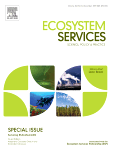Ver ítem
- xmlui.general.dspace_homeCentros Regionales y EEAsCentro Regional Patagonia SurEEA Santa CruzArtículos científicosxmlui.ArtifactBrowser.ItemViewer.trail
- Inicio
- Centros Regionales y EEAs
- Centro Regional Patagonia Sur
- EEA Santa Cruz
- Artículos científicos
- Ver ítem
When we cannot have it all: Ecosystem services trade-offs in the context of spatial planning
Resumen
Spatial planning has to deal with trade-offs between various stakeholders’ wishes and needs as part of planning and management of landscapes, natural resources and/or biodiversity. To make ecosystem services (ES) trade-off research more relevant for spatial planning, we propose an analytical framework, which puts stakeholders, their land-use/management choices, their impact on ES and responses at the centre. Based on 24 cases from around the world, we
[ver mas...]
Spatial planning has to deal with trade-offs between various stakeholders’ wishes and needs as part of planning and management of landscapes, natural resources and/or biodiversity. To make ecosystem services (ES) trade-off research more relevant for spatial planning, we propose an analytical framework, which puts stakeholders, their land-use/management choices, their impact on ES and responses at the centre. Based on 24 cases from around the world, we used this framing to analyse the appearance and diversity of real-world ES trade-offs. They cover a wide range of trade-offs related to ecosystem use, including: land-use change, management regimes, technical versus nature-based solutions, natural resource use, and management of species. The ES trade-offs studied featured a complexity that was far greater than what is often described in the ES literature. Influential users and context setters are at the core of the trade-off decision-making, but most of the impact is felt by non-influential users. Provisioning and cultural ES were the most targeted in the studied trade-offs, but regulating ES were the most impacted. Stakeholders’ characteristics, such as influence, impact faced, and concerns can partially explain their position and response in relation to trade-offs. Based on the research findings, we formulate recommendations for spatial planning.
[Cerrar]

Autor
Turkelboom, Francis;
Leone, Michael;
Jacobs, Sander;
Kelemen, Eszter;
García-Llorente, Marina;
Baró, Francesc;
Termansen, Mette;
Barton, David N.;
Berry, Pam;
Stange, Erik;
Thoonen, Marijke;
Kalóczkai, Ágnes;
Vadineanu, Angheluta;
Castro, Antonio J.;
Czúcz, Bálint;
Röckmann, Christine;
Wurbs, Daniel;
Odee, David;
Preda, Elena;
Gómez-Baggethun, Erik;
Rusch, Graciela M.;
Martinez Pastur, Guillermo José;
Palomo, Ignacio;
Dick, Jan;
Casaer, Jim;
van Dijk, Jiska;
Priess, Joerg A.;
Langemeyer, Johannes;
Mustajoki, Jyri;
Kopperoinen, Leena;
Baptist, Martin J.;
Peri, Pablo Luis;
Rusch, Veronica Elena;
Mukhopadhyay, Raktima;
Aszalós, Réka;
Roy, S.B.;
Luque, Sandra;
Fuente
Ecosystem services 29 Part C : 566-578. (February 2018)
Fecha
2017
Formato
pdf
Tipo de documento
artículo
Palabras Claves
Derechos de acceso
Restringido
 Excepto donde se diga explicitamente, este item se publica bajo la siguiente descripción: Creative Commons Attribution-NonCommercial-ShareAlike 2.5 Unported (CC BY-NC-SA 2.5)
Excepto donde se diga explicitamente, este item se publica bajo la siguiente descripción: Creative Commons Attribution-NonCommercial-ShareAlike 2.5 Unported (CC BY-NC-SA 2.5)

